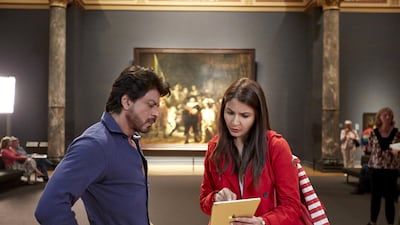The unthinkable has happened: nearly every big-budget Bollywood movie this year so far has fizzled out within days of opening in cinemas. It made no difference that each was led by top-rung stars. From Salman Khan's period war drama Tubelight to Ranbir Kapoor's madcap adventure Jagga Jasoos, and the biggest shocker of the year, Shah Rukh Khan's epic romantic drama Jab Harry Met Sejal, the Hindi film industry is reeling from the blows.
__________________________
Read more:
Film review: Salman Khan can't save the cloying melodrama that is Tubelight
Shah Rukh Khan's latest Bollywood film fails to light up box office
Film review: Kapoor and Kaif entertain and no more in Jagga Jasoos
__________________________
JHMS, which cost 900 million rupees (Dh51.6m) to make, has been pronounced a flop barely a week after it was released. To be declared a hit, the film needs to earn 1.5 billion rupees at the box office, but with the takings standing at 560 million rupees so far, it doesn't seem likely to happen anytime soon. This is despite the fact that the film did well overseas on its opening weekend, collecting US$2.3m (Dh8.5m) in the Middle East, and a total of $2.8m in Britain, the United States, Canada, Australia and Pakistan.
Indian cinema trade analyst Taran Adarsh spoke of his bewilderment after the first reviews began to filter in.
Adarsh is concerned about this sudden downward trend in big Bollywood films, and warns of greater repercussions.
Adarsh has a point: when the Khans of Bollywood begin to misfire, it tells you there's something intrinsically wrong with the system. But the analyst might miss the mark when he says the audience is not a factor.
Increasingly liberal, highly educated and discerning cinemagoers in the big cities – where big-banner films make most of their money – aren't the starstruck fans of a decade ago. They don't flock to theatres for their weekly dose of escapism, but instead they go there to appreciate good cinema.
Stars such as SRK and Salman Khan, whose careers span nearly 30 years, do not seem to be meeting this need. Reluctant to step outside their comfort zones, they continue to peddle melodrama and cheesy romance.
Most directors tailor-make scripts that stroke the egos of A-listers, who, besides demanding huge fees, prefer the tried-and-tested "masala" formula.
"Filmmakers are under the impression that superstars can sell bad content, but it doesn't work that way," trade analyst Komal Nahta told The Times of India. "Stardom … can work only up to a point and after that the content has to speak for itself. With both Tubelight and Jab Harry Met Sejal, the content was very poor."
At the same time, audiences are thriving on a steady diet of thought-provoking, edgy fare dished up by imaginative filmmakers, who, undaunted by the conservative Central Board for Film Certification, are taking on controversial topics. In doing so, these new talents seem to be challenging the establishment, replacing the usual Bollywood components – kitschy glamour, long song sequences and over-the-top action – with narratives that strike a chord.
Interestingly, these auteurs are not looking to join the elite 2-billion-rupee club, that hallowed circle of Bollywood super hits, but aim to enjoy a presentable profit.
Lipstick Under My Burkha, Alankrita Shrivastava's touching paean to women, was produced on a budget of 65 million rupees. It has made 239 million rupees since it was released on July 21, and is still running in cinemas. Documenting the secret lives of four women oppressed by outdated social customs, Lipstick resonated with audiences and has been declared a hit.
__________________________
Read more: Watching Lipstick Under My Burkha is an empowering experience
__________________________
Then there's Haraamkhor, an audacious, small-budget movie by Shlok Sharma that explores the relationship between a middle-aged schoolteacher and his young pupil. Filmed in 16 days and costing about 40 million rupees – lead actor Nawazuddin Siddiqui reportedly charged a token fee of one rupee – Haraamkhor wasn't a commercial success but it enjoyed critical acclaim.
__________________________
Read more: After Udta Punjab, Bollywood film Haraamkhor in trouble with censor board
__________________________
Many directors are also choosing to set their films in India's hinterland, instead of the metropolises and foreign locales traditionally favoured by Bollywood's heavyweight production giants such as Yash Raj Films and Dharma Productions. The story of Haraamkhor, for example, unfolds in a nondescript village in Gujarat.
This gradual shift towards rural, unseen India – with accurate representation of culture and painstaking research of dialect – is appreciated by audiences in big cities, where the demographic, once homogenous and predictable, now consists of a rich mix of migrants from far-flung outposts and towns.
Perhaps SRK and Salman need to look to the third Khan in their triumvirate: Aamir, an astute actor and producer whose films are always heavy on good quality content. His last venture, the sports biopic Dangal (2016), was a mega-hit.
__________________________
Read more: Indian actor Aamir now Bollywood's 'King of the Khans'
__________________________
Another big Bollywood star, Akshay Kumar, stars in the much-anticipated Toilet: Ek Prem Katha (Toilet: A Love Story), which opened on Thursday in the UAE. The simple romance, with Bhumi Pednekar cast as Kumar's love interest, frames one of India's biggest social issues: the lack of toilets in village homes. Women are forced to go outside at night, putting their health and safety at risk.
Directed by Shree Narayan Singh, the movie aims to spread awareness about the problem, in line with prime minister Narendra Modi's Swachh Bharat (Clean India) campaign.
"Will Toilet... prove a saviour?" Adarsh tweeted earlier this week. "Let's hope it bails out the industry."
__________________________
Read more: Film review: Toilet: Ek Prem Katha takes an honest look at daily dangers
__________________________


